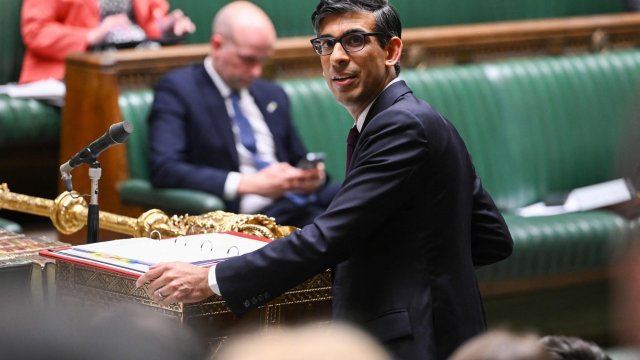
Westminster summer party season brings out some odd behaviours in the flocks of MPs thronging around warm white wine watering holes. There’s the way they knot together in a corner of a garden in the hope they might be able to shake the Prime Minister’s hand, however briefly. Then there’s the over-the-shoulder gaze, most characteristic of the Ever-Spotted Matt Hancock but very common in species of backbenchers who hope there might be someone more important approaching who they can talk to instead. At the moment, both Labour and Conservatives are seeing plenty of peacocking displays, too, because everyone is expecting a reshuffle.
Tory ministers in some departments are reported to have “checked out mentally” (in common with many of their backbench colleagues who seem to be largely inert and waiting for defeat). The wider party, meanwhile, is more interested in the policymaking process for after the next election, with the newest ginger group in the party, the New Conservatives, calling for tougher policies on net migration.
Labour is descending into a bout of angry pecking. Some frontbenchers are muttering darkly that Wes Streeting is being allowed to promote his book too much over and above the party’s own policies, while others are moaning about “dead wood” colleagues who aren’t pulling their weight. And there is no shortage of ambitious junior shadow ministers who want a bigger job – or feel they’re already doing the big policy thinking that their shadow secretary of state is then taking credit for.
One of the regular complaints I hear from junior shadow ministers is that they’re still stuck under Shadow Cabinet ministers who “aren’t going the full hog on reform”. One ambitious type tells me: “We have got this split in the party between my colleagues who think that we are pretty much there when it comes to an election victory and that we just need to avoid scaring voters, and those of us who think we actually need to offer voters an idea of a new, different Britain. Currently we are too focused on talking about fixing things, not redesigning them.”
Being a Labour frontbencher today brings with it a lot of freedom and power. Starmer is the sort of leader who will happily let his team get on with designing things, sometimes to a fault. The row in the party over Ed Miliband’s £28bn green energy plan came about partly because the leader trusted his shadow Net Zero Secretary more than others did: Scottish Labour figures are still smarting that Starmer has capitulated to Miliband on the plan to ban new licences for oil and gas, which they say will “devastate” cities like Aberdeen whose inhabitants simply don’t believe they’ll be able to move to the promised green jobs of the future. But for all the moaning about Miliband, he is valuable to Starmer because he works hard and has plenty of ideas on offer: his frontbench colleagues would do better to imitate his work ethic rather than grumpily wish him gone.
As one MP says, Miliband is seen as someone who “has lots of ideas, not always the most sensible ones, but he’s always thinking and that’s good to be around.”
One of Miliband’s allies, Lucy Powell, is keen for a sideways move to become shadow science and technology secretary, which has generated quite a pushback from her colleagues who think she doesn’t understand artificial intelligence, having admitted in a recent interview that she’d only asked ChatGPT to “write jokes about Conservatives” (she said it didn’t work for her). She also has a rival: Darren Jones, currently chair of the Business and Trade Select Committee, has made it very clear to the Labour leadership that he wants the job and knows his stuff too. Starmer may also want a chance to reward Peter Kyle, the shadow Northern Ireland Secretary who is going all out for a Labour victory in Mid Bedfordshire as its campaign manager and who colleagues believe deserves a more public-facing role in the Shadow Cabinet.
Others are under threat of demotion. Jim McMahon is the genial shadow Environment Secretary – for now – and only narrowly avoided getting the chop last time Starmer changed up his top team. His name was on the board for being sacked, but removed at the very last minute. This time around he’s likely to be less lucky. “He is such a nice guy and was great as a council leader, but Jim has basically piggybacked on Feargal Sharkey on the sewage stuff,” complains one colleague.
What you won’t see is a big change to the very big jobs. Starmer is happy with his shadow Chancellor, shadow Foreign Secretary and shadow Home Secretary, even though Tory MPs often mock Yvette Cooper for failing to lay a finger on Suella Braverman despite ample opportunity. Deputy Leader, Angela Rayner, has her own mandate for that particular job title, but she might also get a move to another department such as Levelling Up, but only if the conversation goes the right way: Starmer is anxious not to repeat his disastrous attempt to sack her from the party chair job two years ago, which culminated in Rayner bagging a new, more powerful, list of job titles almost as long as the row the pair had had. But the Labour leader’s allies also don’t want it to appear as though Rayner can just take her pick of jobs and demand Starmer grant them to her: they argue she’s not as politically strong as she was back in 2021.
Starmer is currently largely planning to line up departments to match the current shape of government: “Keir would need to be convinced that anything except machinery of government changes are actually going to help us win the election,” comments one source.
He’s also not likely to make any changes before the July by-elections, or indeed the party’s National Policy Forum, which is where the manifesto outlines and key red lines get thrashed out in rather sweaty rooms between the many different groups making up the Labour Party structure.
This jostling for jobs is what a party that thinks it’s going into government does when a reshuffle is looming: getting promoted now gives you a chance of being the minister who can hit the ground running with a really exciting programme for reform. Shadow ministers are getting attention from business and from media figures who until recently barely knew their names. Hell, they’re even being invited to summer parties, where people want to talk to them after a decade of gazing over their shoulders to the more powerful Conservatives in the next clutch of guests. No wonder they’re looking over their own shoulders, checking they’re still going to be in jobs that for the first time in a long time, they’re actually able to enjoy.
Isabel Hardman is assistant editor of The Spectator magazine


